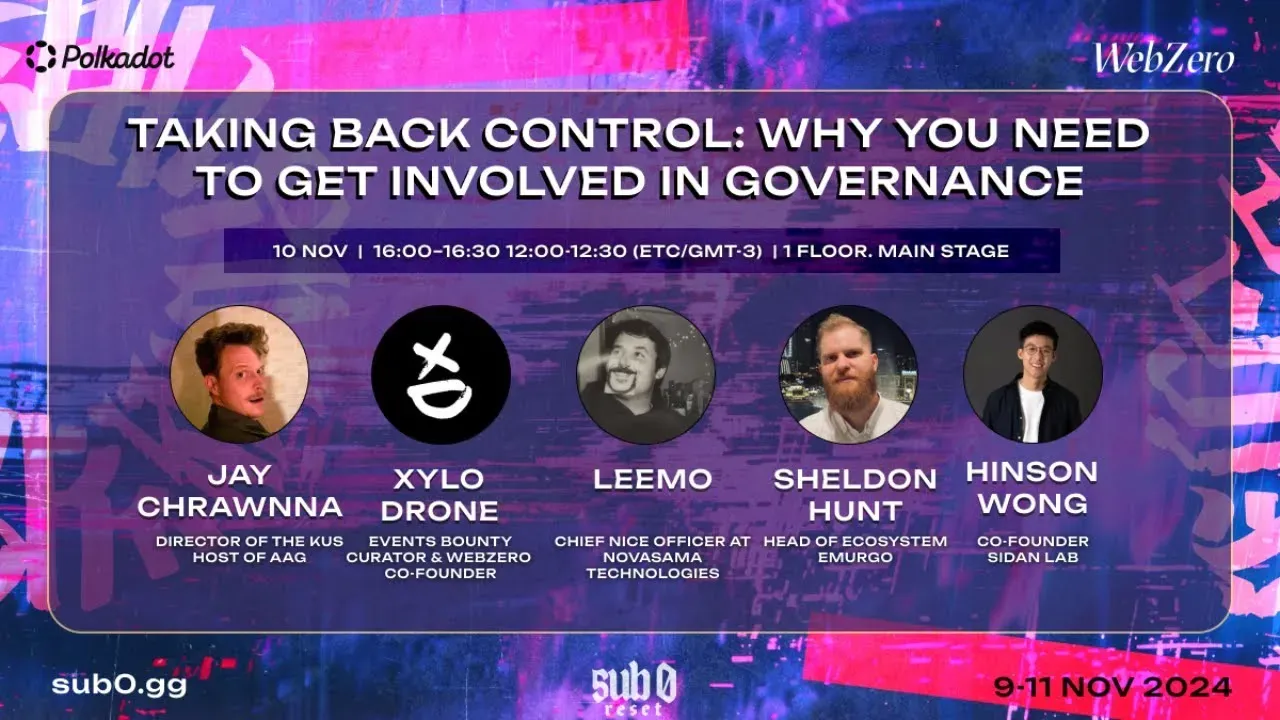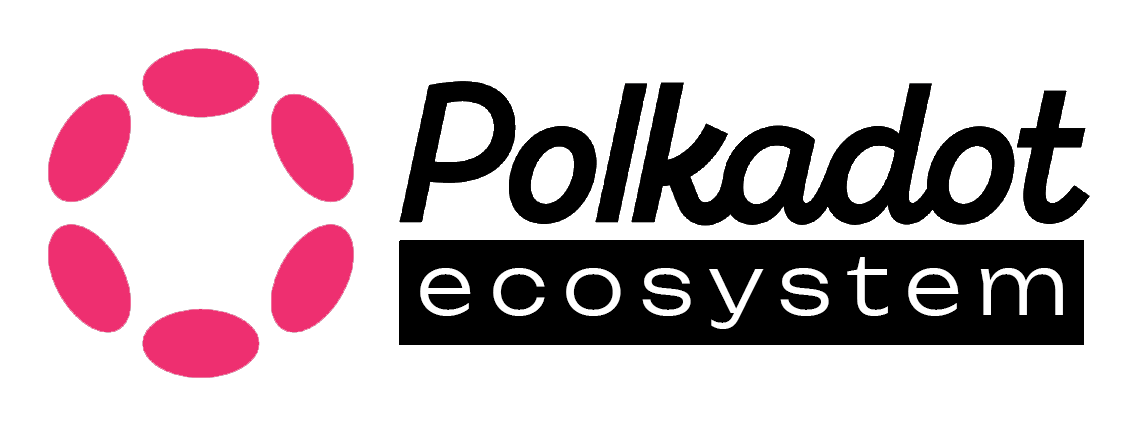Why You Need to Get Involved in Governance
Esta página aún no está disponible en tu idioma.

The Sub0 Reset 2024 event featured a compelling panel discussion titled “Taking Back Control: Why You Need to Get Involved in Governance.” This insightful session brought together thought leaders from the Polkadot and Cardano ecosystems to explore the evolution of on-chain governance, the role of community-driven decision-making, and the potential for cross-chain governance to foster interoperability. Panelists shared lessons learned, debated challenges, and outlined the future of governance in decentralized ecosystems.
The Panelists
- Xylo Drone - Co-founder of WebZero and curator of the Events Bounty.
- Leemo - Chief Nice Officer at Novasama Technologies and co-founder of Chaos DAO.
- Jay Chrawnna - Director of The Kus and host of Attempts at Governance.
- Hinson Wong - Co-founder of DeltaDeFi and SIDAN Lab, with contributions to Cardano’s SDK development.
- Sheldon Hunt - Head of Ecosystem at Emurgo, a founding entity of Cardano.
The discussion highlighted both the commonalities and divergences in governance practices within Polkadot and Cardano, offering valuable perspectives for the broader Web3 community.
A Snapshot of Governance in Polkadot and Cardano
Both ecosystems are pioneers in exploring decentralized governance mechanisms. While Polkadot’s open governance model is self-executing, enabling proposals to autonomously take effect upon approval, Cardano’s governance is still transitioning from administrative oversight to fully decentralized decision-making.
Governance Models Compared
| Feature | Polkadot Governance | Cardano Governance |
|---|---|---|
| Self-Execution | Fully autonomous | Partial, transitioning to full autonomy |
| Voting Power | Token-based with a lock-up multiplier | One token, one vote |
| Proposal Handling | Community-led with structured tracks | Administrative layer with oversight |
| Treasury Management | Iterative funding requests | Significant proposals in early stages |
Key Takeaways from the Discussion
1. Cross-Chain Governance: Enhancing Interoperability
The panelists discussed the potential of cross-chain governance to bridge ecosystems, enhancing interoperability and reducing fragmentation. By aligning governance standards, decentralized networks can foster collaborative innovation, benefiting both technical development and community cohesion.
2. Controversial Proposals: Lessons Learned
Several controversial governance proposals were analyzed:
- Cardano’s Catalyst Projects: Controversial initiatives, such as the proposed $100M VC fund, revealed the need for stricter oversight and transparency.
- Polkadot’s Force Transfer Debates: These proposals sparked heated discussions on the balance between technical capabilities and ethical considerations.
The consensus was clear: decentralization requires robust social consensus mechanisms alongside technical solutions.
3. Challenges in Governance
Both ecosystems face challenges that include low voter participation, the influence of whales, and the risk of bureaucratic overreach. Cardano’s reliance on an administrative layer and Polkadot’s fast-paced governance cycles underscore the importance of balancing inclusivity with efficiency.
4. Building Trust Through Incremental Funding
Polkadot’s iterative funding model was highlighted as a best practice. By allocating smaller budgets for initial projects and scaling based on performance, the ecosystem ensures accountability and minimizes waste. This approach contrasts with Cardano’s larger, upfront funding allocations, which can lead to inefficiencies.
Community Engagement: A Cornerstone of Governance
One of the most pressing issues discussed was the need to evangelize governance participation. Effective community engagement involves:
- Clear Documentation: Ensuring that voters and contributors have access to user-friendly guides and transparent records.
- Educational Campaigns: Hosting podcasts, webinars, and AMAs to demystify governance.
- Decentralized Voting Groups: Encouraging smaller token holders to form collectives, amplifying their impact on decision-making.
Polkadot’s Chaos DAO and OpenGov model were cited as examples of how structured participation can lead to more informed and democratic governance.
Looking Ahead: The Future of Decentralized Governance
The panel concluded by emphasizing the importance of governance models that are resilient, inclusive, and adaptable. As AI and automation increasingly integrate with blockchain technology, keeping the “human” aspect of governance intact will be crucial.
Cardano’s upcoming constitutional convention in Buenos Aires and Polkadot’s ongoing governance experiments both represent critical steps in this direction. By fostering collaboration and sharing lessons learned, these ecosystems can continue to drive innovation in decentralized governance.
Final Thoughts
The Sub0 Reset 2024 governance panel underscored the critical role of governance in shaping the future of decentralized ecosystems. As Polkadot and Cardano navigate the complexities of governance, their experiences serve as a beacon for other blockchain projects aiming to empower communities and achieve true decentralization. The path ahead is challenging, but through collaboration, transparency, and innovation, the potential for a fairer, more inclusive Web3 future remains within reach.

